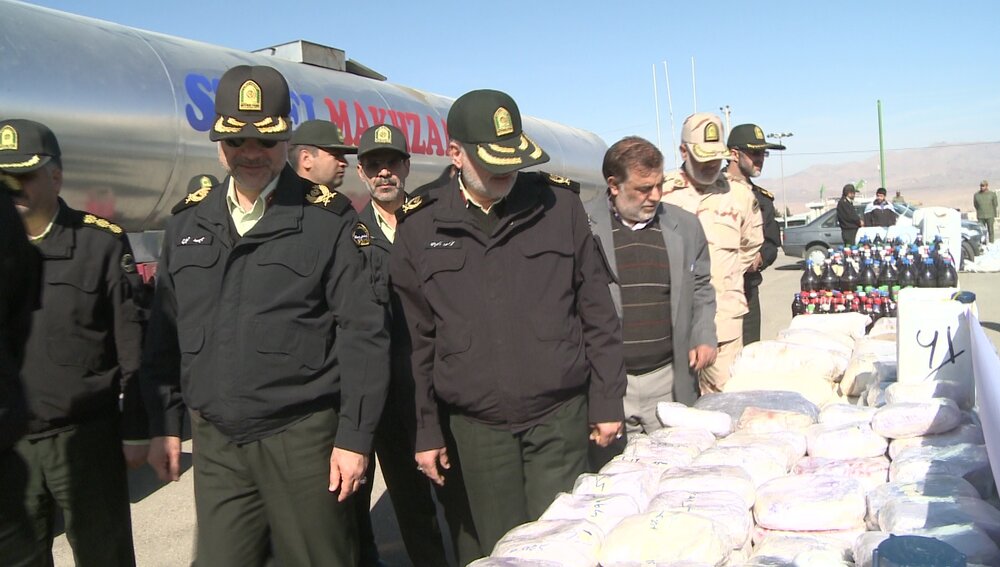Global anti-narcotics fight not to succeed without Iran

TEHRAN – Iran is the main partner in the fight against narcotics, and if excluded, the global attempt will not be successful, Amir Abbas Lotfi, spokesman for the anti-narcotics headquarters said. Stating that the anti-narcotics field is one of the main humanitarian and non-profit international activities, he stressed that no challenge or obstacle will undermine the determination of Iran to fight against drug trafficking.
He referred to the formation of a regional cooperation program consisting of Afghanistan, Iran, Pakistan, Turkmenistan, Tajikistan, Kyrgyzstan, Uzbekistan, and Kazakhstan and said “Because the source of drug production in the region is Afghanistan, the necessity of forming this regional program has doubled, while Iran is the main partner without which the struggle will not be successful.”
The “tripartite initiative” is another regional cooperation established between Iran, Afghanistan, and Pakistan under the auspices of the United Nations., he said.
Prior to 2007, there was an Iran-Afghanistan-Pakistan intergovernmental committee, which was initiated by Iran. But later the need for a UN presence on the committee was raised, which led to a structural change and the formation of a “tripartite initiative plus the UN”, he further explained.
He went on to note that the joint planning unit of the tripartite initiative is in Tehran, highlighting, very good measures have been taken in this area, including patrolling, conducting simultaneous operations, and exchanging information.
Afghanistan and Pakistan face financial constraints, and the United Nations has agreed to pay for the mission of Afghan and Pakistani agents to help streamline and mobilize this regional initiative, he added.
Any action in the region requires special attention to Afghanistan because any counter-narcotics must start from the beginning, at the same time, European and Western countries, as the main donors to the UN Fund, should not forget their responsibility, he emphasized.
Methamphetamine production in Afghanistan: a new challenge
Lamenting that being involved in the production of opium, heroin, and morphine for many years, he said that the new challenge for the countries of the region and the world in the fight against narcotics is the increase in production of methamphetamine in Afghanistan over the past two years.
In order to find a solution to this issue, several talks were held with Afghan officials in various meetings, and promises made to address the issue. Fortunately, the Afghan anti-narcotics officer is a member of the tripartite initiative, which we hope will lead to a reduction in methamphetamine production.
Lotfi expressed regret that the production of narcotics is largely due to the unrest in some parts of the country and hoped that the Afghan government will be able to enforce the law throughout Afghanistan, insisting that Iran is also fully prepared to provide the necessary support to Afghanistan at all levels to ensure that all narcotics are eradicated in this country.
Brigadier General Eskandar Momeni, Secretary-General of Iran Drug Control Headquarters said that in 2000, the total production of narcotics in Afghanistan was about 200 tons, which in 2017 reached more than 9,000 tons, an increase of nearly 50 times.
According to Momeni, about 500 tons of drugs were discovered in the first five months of this year, which has increased by 30 percent compared to the same period last year.
Iran seized some 1,000 tons of narcotics in the previous Iranian calendar year (ended March 20), putting the country in the first place in the world, Momeni said in July.
The United Nations Office on Drugs and Crime (UNODC) has praised Iran’s efforts to fight against narcotics trafficking on the occasion of International Day Against Drug Abuse and Illicit Trafficking.
The organization also officially announced that the world’s first place in the discovery of opium, heroin, and morphine belongs to Iran.
According to UNODC, Iran remains one of the major transit routes for drug trafficking from Afghanistan to European countries and has had a leading role at the global level in the drug-control campaigns.
UNODC World Drug Report 2020 estimates that in 2018, 91 percent of world opium, 48 percent of the world morphine, and 26 percent of the world heroin were seized by Iran.
Iran’s drug control efforts led to the seizure of 266 tons of different types of drugs during the period of April-June 2020, a 20 percent increase compared to the same period in 2019.
During the COVID-19 pandemic in Iran, Drug Control Headquarters provided and distributed Personal Protective Equipment (PPE) and other sanitary commodities among street users and NGOs working with drug users.
In the end, the anti-narcotic police and law enforcement of Iran held a burning ceremony of 90 tons of different types of drugs in provinces of Sistan-Baluchestan, Kerman, and West Azarbaijan, televised through the internet.
After the Islamic Revolution (in 1979), 3,800 were martyred, 12,000 were wounded and disabled in the fight against drug trafficking, Momeni announced.
Drug use is a complex health and social problem worldwide, with half a million people dying each year as a result of drug abuse, he lamented, adding, drug use has entered a critical condition, and the international community is determined to tackle the global drug problem.
FB/MG
